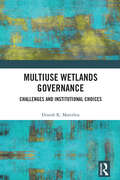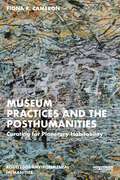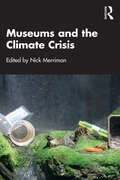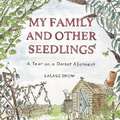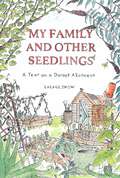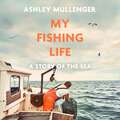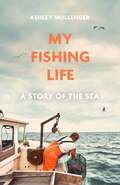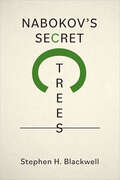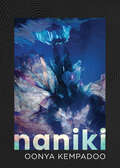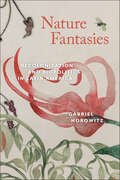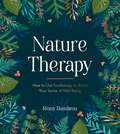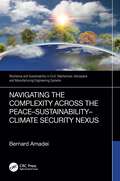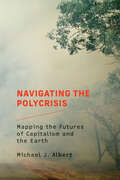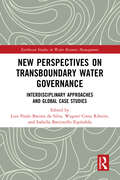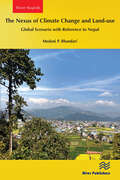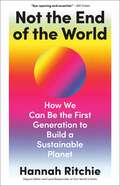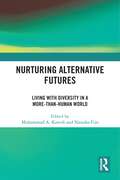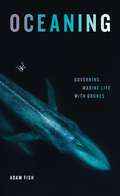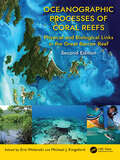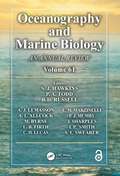- Table View
- List View
Multiuse Wetlands Governance: Challenges and Institutional Choices
by Dinesh K. MarothiaThe Ramsar Convention was established in 1971 to ensure the conservation and wise use of wetlands across the world. India joined the Convention in 1982, however, in the past 50 years despite Ramsar’s incredible achievements, the threat to wetlands across the globe, including India, has not diminished. This book studies the governance of multiuse wetlands in India. The volume provides an exhaustive analysis of rural, peri-urban and urban human-made wetlands to establish the relevance of institutional design and the effective role of authority in governing multiuse wetland ecosystem services. The author argues that the most challenging task in governing wetlands is to frame institutional choices that users and non-users comprehend, and agree to pursue under alternative property rights regimes. Drawing on extensive fieldwork, the book provides a broader look into the causes and consequences of wetland ecosystem degradation and offers insights into improved sustainable management systems for different types of multiuse wetlands. It will be indispensable for students and researchers of environmental studies, sustainable development, biodiversity, conservation, agricultural, natural, and environmental resource economics.
Museum Practices and the Posthumanities: Curating for Planetary Habitability (Routledge Environmental Humanities)
by Fiona R. CameronThis book critiques modern museologies and curatorial practices that have been complicit in emerging existential crises. It confidently presents novel, more-than-human curatorial visions, methods, frameworks, policies, and museologies radically refiguring the epistemological foundations of curatorial, museological thinking, and practice for a habitable planet. Modern curatorial and museological practices are dominated by modern humanism in which capital growth, social, technological advancement, hubris, extraction, speciest logics, and colonial domination predominate, often without reflection. While history, science, and technology museums and their engagement with non-human worlds have always been ecological as an empirical reality, the human-centred frameworks and forms of human agency that institutions deploy tend to be non-cognizant of this reality. Museum Practices and the Posthumanities: Curating for Planetary Habitability reveals how these practices are ill-equipped to deal with the contemporary world of rapid digital transformations, post-Covid living, climate change, and its impacts among other societal changes, and it shows how museums might best meet these challenges by thinking with and in more-than-human worlds. This book is aimed at museological scholars and museum professionals, and it will provide them with the inspiration to conduct research on and curate from a different ecological reference point to promote a world good enough for all things to thrive in radical co-existence.
Museums and the Climate Crisis
by Nick MerrimanMuseums and the Climate Crisis shows how museums can respond to the interrelated global climate, biodiversity and pollution crises. They have a unique role because they take a long-term perspective, and their scholarship and independence mean that they remain trusted by the public. Providing insights and international case studies from a range of museum and gallery professionals, academics and consultants, this book explores how museums can use this unique perspective to engage the public as active citizens, and how they are exemplars of good practice in areas such as emissions reduction and encouraging biodiversity. It shows how museums can combat climate exhaustion by drawing on understandings about positive motivation, and how to develop exhibitions, events and activities that motivate visitors to take action. Taking a broad approach beyond purely climate issues, the contributions touch on the use of renewables, environmental controls and standards, travel (including virtual couriering), waste management (including recycling, plastic reduction and composting), reducing pollution and increasing biodiversity within museums. Museums and the Climate Crisis will be important reading to those studying in the fields of Museum Studies, Heritage Studies and Conservation. Taking a practical approach, it will also be beneficial to museum, gallery and heritage professionals who are grappling with the challenges of the climate crisis.
My Family and Other Seedlings: A Year on a Dorset Allotment
by Lalage SnowA few years ago Lally Snow moved to a Dorset village with her husband and three small children, having spent over a decade as a war photographer, foreign correspondent and film maker living in Kabul. She covered the conflict there as well as other wars from Gaza to Eastern Ukraine, and Iraq.In the late winter of 2021-22, Lally decided to rent an allotment, despite having only a rudimentary knowledge of gardening. She was starting from scratch and setting herself the dual challenge of growing an allotment at the same time as growing a family.This is a heart-warming, wry and at times tearful account of Lally's travails as a mother and novice allotment holder, counterpointing horticultural progress with the perils of parenting. Along the way she reflects on the drudgery of English rural domesticity after a professional life chasing war and adventure, the history of the allotment since Saxon times, and the wonderful moment when gardening becomes fun rather than just feeding a family.
My Family and Other Seedlings: A Year on a Dorset Allotment
by Lalage SnowA few years ago Lally Snow moved to a Dorset village with her husband and three small children, having spent over a decade as a war photographer, foreign correspondent and film maker living in Kabul. She covered the conflict there as well as other wars from Gaza to Eastern Ukraine, and Iraq.In the late winter of 2021-22, Lally decided to rent an allotment, despite having only a rudimentary knowledge of gardening. She was starting from scratch and setting herself the dual challenge of growing an allotment at the same time as growing a family.This is a heart-warming, wry and at times tearful account of Lally's travails as a mother and novice allotment holder, counterpointing horticultural progress with the perils of parenting. Along the way she reflects on the drudgery of English rural domesticity after a professional life chasing war and adventure, the history of the allotment since Saxon times, and the wonderful moment when gardening becomes fun rather than just feeding a family.
My Family and Other Seedlings: A Year on a Dorset Allotment
by Lalage SnowA few years ago Lally Snow moved to a Dorset village with her husband and three small children, having spent over a decade as a war photographer, foreign correspondent and film maker living in Kabul. She covered the conflict there as well as other wars from Gaza to Eastern Ukraine, and Iraq.In the late winter of 2021-22, Lally decided to rent an allotment, despite having only a rudimentary knowledge of gardening. She was starting from scratch and setting herself the dual challenge of growing an allotment at the same time as growing a family.This is a heart-warming, wry and at times tearful account of Lally's travails as a mother and novice allotment holder, counterpointing horticultural progress with the perils of parenting. Along the way she reflects on the drudgery of English rural domesticity after a professional life chasing war and adventure, the history of the allotment since Saxon times, and the wonderful moment when gardening becomes fun rather than just feeding a family.
My Fishing Life: A Story of the Sea
by Ashley Mullenger'A beautiful, heartfelt love letter to the sea, and a cherished industry. Ash is a force of nature, she's a testament to working hard and dreaming big' Dermot O'LearyAshley Mullenger had never planned to become a fisherman. A chance fishing trip - catching mackerel off the Norfolk coast - was the start of an obsession. One that resulted in a transformation from clean-cut office worker to commercial 'Fisherman of the Year', and proud working owner of two boats, Fairlass and Saoirse, alongside skipper Nigel.This is a memoir of that journey, a life swept up in tides and elements, strength of mind and body, of old ways and new struggles. It's about the bravery of crews, early mornings, weather-beaten characters and those that can sink pints as fast as they can haul pots. These coastal communities and age-old livelihoods are built on trust, courage and skill - but they are also fraying against politics, poverty and climate change. The reality of commercial fishing is rarely seen, but Ashley carries us across the waves and around the UK's waters in vivid detail to show what is really happening at sea to land the fish on our plates.My Fishing Life is both a rallying cry and a love letter, rinsed down with salty humour, to an industry often misunderstood. One woman's unique story of boat, skipper, sea and catch ultimately becomes a transformative view of a world that impacts deeply on us all.
My Fishing Life: A Story of the Sea
by Ashley Mullenger'A beautiful, heartfelt love letter to the sea, and a cherished industry. Ash is a force of nature, she's a testament to working hard and dreaming big' Dermot O'LearyAshley Mullenger had never planned to become a fisherman. A chance fishing trip - catching mackerel off the Norfolk coast - was the start of an obsession. One that resulted in a transformation from clean-cut office worker to commercial 'Fisherman of the Year', and proud working owner of two boats, Fairlass and Saoirse, alongside skipper Nigel.This is a memoir of that journey, a life swept up in tides and elements, strength of mind and body, of old ways and new struggles. It's about the bravery of crews, early mornings, weather-beaten characters and those that can sink pints as fast as they can haul pots. These coastal communities and age-old livelihoods are built on trust, courage and skill - but they are also fraying against politics, poverty and climate change. The reality of commercial fishing is rarely seen, but Ashley carries us across the waves and around the UK's waters in vivid detail to show what is really happening at sea to land the fish on our plates.My Fishing Life is both a rallying cry and a love letter, rinsed down with salty humour, to an industry often misunderstood. One woman's unique story of boat, skipper, sea and catch ultimately becomes a transformative view of a world that impacts deeply on us all.
My Fishing Life: A Story of the Sea
by Ashley Mullenger'A beautiful, heartfelt love letter to the sea, and a cherished industry. Ash is a force of nature, she's a testament to working hard and dreaming big' Dermot O'LearyAshley Mullenger had never planned to become a fisherman. A chance fishing trip - catching mackerel off the Norfolk coast - was the start of an obsession. One that resulted in a transformation from clean-cut office worker to commercial 'Fisherman of the Year', and proud working owner of two boats, Fairlass and Saoirse, alongside skipper Nigel.This is a memoir of that journey, a life swept up in tides and elements, strength of mind and body, of old ways and new struggles. It's about the bravery of crews, early mornings, weather-beaten characters and those that can sink pints as fast as they can haul pots. These coastal communities and age-old livelihoods are built on trust, courage and skill - but they are also fraying against politics, poverty and climate change. The reality of commercial fishing is rarely seen, but Ashley carries us across the waves and around the UK's waters in vivid detail to show what is really happening at sea to land the fish on our plates.My Fishing Life is both a rallying cry and a love letter, rinsed down with salty humour, to an industry often misunderstood. One woman's unique story of boat, skipper, sea and catch ultimately becomes a transformative view of a world that impacts deeply on us all.
Nabokov’s Secret Trees
by Stephen H. BlackwellIn nearly all his literary works, Vladimir Nabokov inscribed networks of trees to create meaningful patterns of significance around one or more of his passionate interests – in consciousness, memory, creativity, epistemology, ethics, and love, with a deep connection to nature serving as a constant undercurrent. Nabokov’s Secret Trees explores this neglected area of his art, one that positions nature as a hidden but vital core of his work. The book presents an entirely new, previously unsuspected Nabokov, one who crafts intricate patterns of arboreal imagery lurking behind his often-baroque psychological narratives. It reveals how Nabokov activates arboreal potentials by exploring the hidden ubiquity of trees, their essence as complex natural phenomena, and their role as quiet presences that have accompanied and fostered human civilization and art since their beginnings. The book uncovers how trees offer a rich and intricate field for structural, semantic, allusive, and metaphorical exploration. Based on the published corpus as well as archival materials, Nabokov’s Secret Trees demonstrates that trees not only populate Nabokov’s art in stunning, yet furtive, abundance, but also as mysterious natural entities, directly animating his works’ worlds and his readers’ experience of them.
Nachhaltige Gestaltung von lokalen Ernährungssystemen durch Kommunalpolitik und -verwaltung (Stadtforschung aktuell)
by David Sipple Arnim Wiek Heiner SchanzDieses Open Access Buch erarbeitet konkrete Ansatzpunkte, wie die kommunale Praxis in Politik und Verwaltung Beiträge zur Ernährungswende Richtung Nachhaltigkeit leisten kann. Dabei wird u.a. aufgezeigt, dass die Aufgaben von Städten und Gemeinden, beispielsweise bei der öffentlichen Beschaffung, in Planungsfragen oder bei der Wirtschaftsförderung, bereits weit in ernährungsrelevante Bereiche hineinreichen und somit wichtige Hebelpunkte für nachhaltige Praktiken bestehen.
Naniki
by Oonya KempadooThrough luminescent light, ancestral paths, and a Caribbean spirit-inflected world, Naniki explores the musings and inner workings of the deep blue — the Caribbean Sea — and its shape-shifting sea beings.As the sea mirrors the light from the blue skies, and its depths are exposed by daggers of sunlight, so too Naniki reveals and honours the Indigenous roots of the Caribbean and its people, whose destiny is tied to the sea, the vessel of collective memory.Amana and Skelele are made of water and air, their essence intertwined with Taino and African ancestry. They evolved as elemental beings of the Anthropocene, and shape-shifting with their naniki (active spirits) or animal avatars, they begin an archipelagic journey throughout the Caribbean Basin to see the strange future they dreamed of. Until devastation erupts.Tasked by their elders to go back in time to the source of the First People’s knowledge, they must surmount historical and mythological challenges alike. How can they navigate and overcome these obstacles to regenerate themselves, their love, their islands, and their seas?A RARE MACHINES BOOK
Natur als Rechtssubjekt: Die neuseeländische Rechtsetzung als Vorbild für Deutschland
by Katharina Bader-PlabstDas Buch analysiert die Möglichkeit der Normierung eigener Rechte der Natur in der deutschen Rechtsordnung. Als Inspiration hierzu wird der Vergleich zur Eigenrechtsgesetzgebung in Neuseeland gezogen. Neuseeland normierte als eines der ersten Länder der Welt eigene Rechte der Natur, indem das Land den Te Urewera Wald und den Whanganui Fluss als Rechtssubjekte gesetzlich anerkannte. Die Gesetzgebung wurde weltweit als umweltrechtliche Pionierleistung gefeiert. In Zeiten der Klima- und Biodiversitätskrise liegt daher der Gedanke nahe, auch im deutschen Rechtssystem über die rechtliche Aufwertung der Natur nachzudenken. Die Arbeit befasst sich daher mit der Frage, ob Rechte der Natur nach neuseeländischem Vorbild in Deutschland sowohl rechtlich zulässig als auch geboten und erforderlich sind.
Nature Fantasies: Decolonization and Biopolitics in Latin America (Bucknell Studies in Latin American Literature and Theory)
by Gabriel HorowitzIn this original study, Gabriel Horowitz examines the work of select nineteenth- and twentieth-century Latin American writers through the lens of contemporary theoretical debates about nature, postcoloniality, and national identity. In the work of José Martí, Gertrudis Gómez de Avellaneda, Jorge Luis Borges, Augusto Roa Bastos, Cesar Aira, and others, he traces historical constructions of nature in regional intellectual traditions and texts as they inform political culture on the broader global stage. By investigating national literary discourses from Cuba, Argentina, and Paraguay, he identifies a common narrative thread that imagines the utopian wilderness of the New World as a symbolic site of independence from Spain. In these texts, Horowitz argues, an expressed desire to return to the nation’s foundational nature contributed to a movement away from political and social engagement and toward a “biopolitical state,” in which nature, traditionally seen as pre-political, conversely becomes its center.
Nature Therapy: How to Use Ecotherapy to Boost Your Sense of Well-Being
by Rémy DambronNature therapy is the practice of reconnecting with the natural world to refresh your physical and mental well-being. Including tips to help you discover your connection with the outdoors, activity inspiration and a holistic approach to wellness, this book is the ultimate guide to unlocking the transformative power of nature.
Nature Therapy: How to Use Ecotherapy to Boost Your Sense of Well-Being
by Rémy DambronNature therapy is the practice of reconnecting with the natural world to refresh your physical and mental well-being. Including tips to help you discover your connection with the outdoors, activity inspiration and a holistic approach to wellness, this book is the ultimate guide to unlocking the transformative power of nature.
Navigating the Complexity Across the Peace–Sustainability–Climate Security Nexus (Resilience and Sustainability in Civil, Mechanical, Aerospace and Manufacturing Engineering Systems)
by Bernard AmadeiPromoting peace and sustainability in human development while accounting for the risks associated with the impact of climate change on society has become more imperative than ever when addressing humanity's challenges of the twenty-first century. There is enough evidence that peace, sustainability, and climate security are entangled with multiple complex interactions and cannot be dealt with in isolation and independently from the environment and the numerous systems with which they interact. Yet, the intersection of peace, sustainability, and climate security or their opposites (i.e., conflict, unsustainability, and climate vulnerability) is rarely articulated with a systemic mindset. A multi-solving nexus approach is more appropriate to capture the complexity and uncertainty of how the three sectors of peace, sustainability, and climate security play a role in community development, the nature of their causal chains, and the feedback on how community development affects the three sectors. Navigating the Complexity Across the Peace–Sustainability–Climate Security Nexus explores the value proposition of using a systems approach, methodology, and tools to comprehend and model that dynamic. Features of the book: Explores the interaction between the different components of peace and the relationship between peace, sustainability, and climate security using semi-qualitative and quantitative tools; Explains how climate adaptation and mitigation are related to peace or conflict; Presents generic system dynamics modeling that can be used in different contexts.
Navigating the Polycrisis: Mapping the Futures of Capitalism and the Earth
by Michael J. AlbertAn innovative work of realism and utopianism that analyzes the possible futures of the world-system and helps us imagine how we might transition beyond capitalism.The world-system of which we are all a part faces multiple calamities: climate change and mass extinction, the economic and existential threat of AI, the chilling rise of far-right populism, and the invasion of Ukraine, to name only a few. In Navigating the Polycrisis, Michael Albert seeks to illuminate how the &“planetary polycrisis&” will disrupt the global community in the coming decades and how we can best meet these challenges. Albert argues that we must devote more attention to the study of possible futures and adopt transdisciplinary approaches to do so. To provide a new form of critical futures analysis, he offers a theoretical framework—planetary systems thinking—that is informed by complexity theory, world-systems theory, and ecological Marxism. Navigating the Polycrisis builds on existing work on climate futures and the futures of capitalism and makes three main contributions. First, the book brings together modeling projections with critical social theory in a more systematic way than has been done so far. Second, the book shows that in order to grasp the complexity of the planetary polycrisis, we must analyze the convergence of crises encompassing the climate emergency, the structural crisis of global capitalism, net energy decline, food system disruption, pandemic risk, far-right populism, and emerging technological risks (e.g. in the domains of artificial intelligence, biotechnology, and nuclear weapons). And third, the book contributes to existing work on postcapitalist futures by analyzing the processes and mechanisms through which egalitarian transitions beyond capitalism might occur.A much-needed work of global futures studies, Navigating the Polycrisis brings together the rigor of the natural and social sciences and speculative imagination informed by science fiction to forge pathways to our possible global future.
New Perspectives on Transboundary Water Governance: Interdisciplinary Approaches and Global Case Studies (Earthscan Studies in Water Resource Management)
by da Silva, Luis Paulo Batista Wagner Costa Ribeiro Isabela Battistello EspíndolaThis book presents a novel examination of transboundary water governance, drawing on global case studies and applying new theoretical approaches. Excessive consumption and degradation of natural resources can either heighten the risks of conflicts or encourage cooperation within and among countries, and this is particularly pertinent to the governance of water. This book fills a lacuna by providing an interdisciplinary examination of transboundary water governance, presenting a range of novel and emerging theoretical approaches. Acknowledging that issues vary across different regions, the book provides a global view from South and Central America, Africa, Asia, and the Middle East, with the case studies offering civil society and public managers concrete situations that indicate difficulties and successes in water sharing between bordering countries. The volume highlights the links between natural resources, political geography, international politics, and development, with chapters delving into the role of paradiplomacy, the challenges of climate change adaptation, and the interconnections between aquifers and international development. With rising demand for water in the face of climate change, this book aims to stimulate further theoretical, conceptual, and methodological debate in the field of transboundary water governance to ensure peaceful and fair access to shared water resources. This book will be of interest to students and scholars of water resource governance from a wide variety of disciplines, including geography, international relations, global development, and law. It will also be of interest to professionals and policymakers working on natural resource governance and international cooperation.
The Nexus of Climate Change and Land-use – Global Scenario with Reference to Nepal
by Medani P. BhandariThe interplay between land use and climate change is a crucial aspect of sustainable development, especially in Nepal. This book delves into the intricate connections between land-use and climate change in Nepal, shedding light on significant challenges and potential opportunities. Nepal, with its diverse topography and ecosystems, is exceptionally susceptible to the impacts of climate change. The distinctive land-use patterns, encompassing agriculture, forest cover, and urbanization, significantly influence the country's climate resilience and carbon balance. However, rapid population growth, urban expansion, and changing land-use practices have led to environmental degradation and a surge in greenhouse gas emissions. The alarming deforestation, driven by agricultural expansion, infrastructure development, and unsustainable logging, has contributed to carbon emissions and the depletion of vital ecosystem services. Consequently, the conversion of forested land into agricultural fields has negatively affected biodiversity, soil erosion, and water resources, intensifying the vulnerability of communities to climate change. Nevertheless, embracing sustainable land-use practices like afforestation, reforestation, and agroforestry holds promise for mitigating the impacts of climate change and enhancing resilience. The promotion of climate-smart agriculture, watershed management, and community-based forestry can aid in conserving ecosystems, sequestering carbon, and improving livelihoods. This study illustrates the intricate relationship between land-use and climate change, emphasizing the importance of striking a balance in land-use practices, conserving forests, and biodiversity, and promoting sustainable agriculture. These efforts are indispensable for achieving climate resilience and sustainable development in Nepal. By addressing the nexus between land-use and climate change, Nepal can pave the way towards a more sustainable and climate-resilient future. The purpose of this book is to present the core concepts of this issue, inspire further research, and propose solutions to mitigate the problems caused by human disturbances in the Earth's ecosystem.
Not the End of the World: How We Can Be the First Generation to Build a Sustainable Planet
by Hannah RitchieThis "eye-opening and essential" book (Bill Gates) will transform how you see our biggest environmental problems—and explains how we can solve them. It&’s become common to tell kids that they&’re going to die from climate change. We are constantly bombarded by doomsday headlines that tell us the soil won&’t be able to support crops, fish will vanish from our oceans, and that we should reconsider having children. But in this bold, radically hopeful book, data scientist Hannah Ritchie argues that if we zoom out, a very different picture emerges. In fact, the data shows we&’ve made so much progress on these problems that we could be on track to achieve true sustainability for the first time in human history. Did you know that: Carbon emissions per capita are actually down Deforestation peaked back in the 1980s The air we breathe now is vastly improved from centuries ago And more people died from natural disasters a hundred years ago? Packed with the latest research, practical guidance, and enlightening graphics, this book will make you rethink almost everything you&’ve been told about the environment. Not the End of the World will give you the tools to understand our current crisis and make lifestyle changes that actually have an impact. Hannah cuts through the noise by outlining what works, what doesn&’t, and what we urgently need to focus on so we can leave a sustainable planet for future generations. These problems are big. But they are solvable. We are not doomed. We can build a better future for everyone. Let&’s turn that opportunity into reality.
Nurturing Alternative Futures: Living with Diversity in a More-than-Human World
by Muhammad A. Kavesh Natasha FijnDeveloping upon emerging environmental humanities and multispecies anthropological theories, this book provides a fresh perspective on how we might rethink more-than-human relationality and why it is important to "nurture alternative futures." The diverse chapters examine the life trajectories of people, animals, plants, and microbes, their lived experiences and constituted relationality, offering new ways to reinterpret and reimagine a multi-species future in the current era of planetary crisis. The ethnographic case studies from around the world feature a combination of biological and cultural diversity with analyses that prioritize local and Indigenous modes of thinking. While engaging with Mongolian herders, Indigenous Yucatec Mayan, Congolese farmers, rural Pakistani donkey keepers, Australian heritage breed farmers, Croatian cheesemakers, Japanese oyster aquafarmers, Texan corn growers, Californian cannabis producers, or Hindu devotees to the Ganges River, the chapters offer a grounded anthropological understanding of imagining a future in relationality with other beings. The stories, lived experiences, and mutual worlding that this volume presents offer a portrayal of alternative forms of multispecies coexistence, rather than an anthropocentric future.
Oceaning: Governing Marine Life with Drones (Elements)
by Adam FishDrones are revolutionizing ocean conservation. By flying closer and seeing more, drones enhance intimate contact between ocean scientists and activists and marine life. In the process, new dependencies between nature, technology, and humans emerge, and a paradox becomes apparent: Can we have a wild ocean whose survival is reliant upon technology? In Oceaning, Adam Fish answers this question through eight stories of piloting drones to stop the killing of porpoises, sharks, and seabirds and to check the vitality of whales, seals, turtles, and coral reefs. Drone conservation is not the end of nature. Instead, drone conservation results in an ocean whose flourishing both depends upon and escapes the control of technologies. Faulty technology, oceanic and atmospheric turbulence, political corruption, and the inadequacies of basic science serve to foil governance over nature. Fish contends that what emerges is an ocean/culture—a flourishing ocean that is distinct from but exists alongside humanity.
Oceanographic Processes of Coral Reefs: Physical and Biological Links in the Great Barrier Reef
by Eric Wolanski Michael J. KingsfordIn the last two decades since publication of the first edition, substantial advancements have been made in the science, the need for transdisciplinary approaches to coral reef protection greater than ever before. This new edition, now in full color throughout with accompanying animations, goes beyond identifying foundational information and current problems to pinpoint science-based solutions for managers, stakeholders and policy makers. Coral reefs are connected by currents that carry plankton and the larvae of many reef-based organisms. Further, they supply food to reefs. Currents also bring pollutants from the land and, together with the atmosphere, affect the surrounding ocean. The chapters in this book provide a much-needed review of the biophysics of reefs with an emphasis on the Great Barrier Reef as an ecosystem. The focus is on interactions between currents, waves, sediment and the dynamics of coastal and reef-based ecosystems. The topographic complexity of reefs redirects mainstream currents, creates tidal eddies, mushroom jets, boundary layers, stagnation zones, and this turbulence is enhanced by the oceanographic chaos in the adjoining Coral Sea. This is the environment in which particles and organisms, of a range of sizes live, from tiny plankton to megafauna. This generates faunal connectivity at scales of meters to thousands of km within the Great Barrier Reef and with the adjoining ocean. Pollution from land-use is increasing and remedial measures are described both on land and on coral cays. The impact of climate change is quantified in case studies about mangroves and corals. Modelling this biophysical complexity is increasing in sophistication, and the authors suggest how the field can advance further.
Oceanography and Marine Biology: An annual review. Volume 61 (Oceanography and Marine Biology - An Annual Review #61)
by S. J. Hawkins P. A. Todd B. D. Russell A. J. Lemasson A. L. Allcock M. Byrne L. B. Firth C. H. Lucas E. M. Marzinelli P. J. Mumby J. Sharples I. P. Smith S. E. SwearerOceanography and Marine Biology: An Annual Review remains one of the most cited sources in marine science. The increasing interest in work in oceanography and marine biology and its relevance to global environmental issues, especially global climate change and its impacts, creates a demand for authoritative refereed reviews summarising and synthesising the results of both historical and recent research. For more than 50 years, OMBAR has been an essential reference for researchers, students and workers in all fields of marine science. An international Editorial Board ensures global relevance and expert peer review, with editors from Australia, Hong Kong, Ireland, Singapore, and the UK. The series of volumes can be found in the libraries of institutes and universities worldwide. Five of the seven peer-reviewed contributions in Volume 61 are available to read Open Access via this webpage and on OAPEN. Supplementary material is provided online on the Support Materials tab on the book’s www.routledge.com webpage for Reviews 1, 2, 4, 5 and 6.. Volume 61 features a review of 100 years of daily sea surface temperature from the Hopkins Marine Station in Pacific Grove, California; an exploration of the biology and life cycle of enigmatic crustacean y-larvae; a review of the science, policy and management of the Central and South Atlantic Deep Sea benthos; a review of the biodiversity of the Irish-Scottish continental margin; an investigation of how new molecular tools can be used for marine biodiversity and ecosystem assessments, and a look at the resilience of marine organisms to climate change. A final monograph considers enemy shells as refugia from grazing and competition pressure. If you are interested in submitting a review for consideration for publication in OMBAR, please email the new co-Editors in Chief, Dr Peter Todd (dbspat@nus.edu.sg) and Dr Bayden Russell (brussell@hku.hk). Guidelines for contributors to OMBAR, including information on illustration requirements, can be downloaded on the "Support Material" tab on the latest volume’s webpage.
